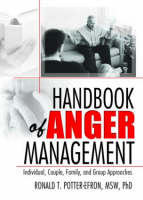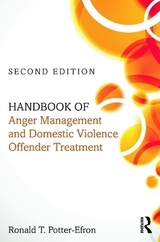
Handbook of Anger Management
Haworth Press Inc (Verlag)
978-0-7890-2455-8 (ISBN)
- Titel erscheint in neuer Auflage
- Artikel merken
Get the most from your ability to work with clients suffering the effects of chronic anger
The Handbook of Anger Management provides therapists and counselors with a comprehensive review of anger and aggression management techniques, presenting specific guidelines to a number of immediately useful methods. Clinical psychotherapist Ronald T. Potter-Efron, Director of the Anger Management Center At First Things First, LTD, in Eau Claire, Wisconsin, offers straightforward solutions to the complicated problem of anger, detailing core treatment options and intervention methods that meet the needs of individual clients, couples, families, and groups. This practical guidebook examines rage, aggression, hostility, resentment, hatred, anger avoidance, and chronic anger and includes fact-based case studies that illustrate effective theory and practice.
The Handbook of Anger Management guides therapists through the process of assessing anger in their clients, determining the reasons forand the consequences ofanger and aggression. The book examines individual and group modalities, using behavioral, cognitive, affective, and existential/spiritual treatment approaches to define anger and anger problems and how they relate to social learning, to examine the relationship between anger and aggression and between anger and domestic violence, and to address the concept of healthy anger.
The Handbook of Anger Management examines:
four major intervention areas that can help lessen anger
the pros and cons of group versus individual counseling
treating angry children, adolescents, and families
how patterns of resentment and hatred are developed
self-forgiveness
five damaging aspects of anger turned inward
the neurological aspects of anger
and much more!
The Handbook of Anger Management is an essential guidebook for psychologists, social workers, anger management therapists, and domestic abuse counselors, and for academics working in mental health fields.
Preface
Acknowledgments
Chapter 1. Introduction
Definitions and Basic Approach
Chapter 2. Assessment for Anger, Aggression, and Domestic Abuse
Introduction
The Anger/Aggression Intake Questionnaire
The State-Trait Anger Expression Inventory
The Anger Styles Questionnaire
Anger Assessment As a Bridge to Treatment
Anger Differential Diagnosis Typology
Domestic Aggression Typology
Adult Psychological Diagnoses and Conditions Associated with Anger and Aggression Problems
Anger, Alcoholism, and Addiction
Case Study: Assessment of a Chronically Angry Client with Multiple Problems
Summary
Chapter 3. Intervention Approaches in Anger Management
Introduction: Intervention Philosophies and Approaches
Behavioral Approach: Introducing Clients to an Objective Change Focus
Cognitive Aspects of Anger Management
Affective Anger Management Approaches
Existential/Spiritual Anger Management Approaches
Case Study: A Woman Who Is Angry at the Universe
Summary
Chapter 4. Group and Individual Approaches to Anger and Aggression Management
Introduction
The General Value of Therapeutic Group Work
Educational/Therapeutic Group Work with Angry and Aggressive Clients
Individualized Anger and Aggression Management Counseling: An Alternative to Group Work
Case Study: A Man Who Benefited from Both Group and Individual Counseling
Summary
Chapter 5. Attachment Theory, Domestic Violence, Jealousy, and Couples Counseling
Introduction
Models of Child Attachment and Adult Attachment
Anger, Abusiveness, and Attachment Styles
Romantic Jealousy and Attachment
Case Study: Excerpts from an Interview with a Jealous Man
Adults with Attachment Concerns: General Therapeutic Considerations
Identifying and Treating Anger Patterns and Losses in Close Relationships Based on Attachment Styles
Couples Counseling from an Attachment Perspective with Physically Violent Couples
Case Study: Couples Therapy with a Mutually Violent Couple
Summary
Chapter 6. Working with Angry Children, Adolescents, and Families
Introduction
Child and Adolescent Susceptibility to Anger Control Problems
Selected Treatment Suggestions with Angry Children and Adolescents
Characteristics of Angry Families
Working with Angry Families
Case Study: Treating an Angry Family
Summary
Chapter 7. Resentment, Hate, Forgiveness, and Self-Forgiveness
Introduction
The Development of Resentment and Hate
Forgiveness As One Way to Diminish Resentment and Hate
Self-Forgiveness
Case Study: A Lesson in Forgiveness
Summary
Chapter 8. Anger Turned Inward
Introduction
Identifying Anger-Turned-Inward Patterns of Behavior
Therapeutic Concepts, Guidelines, Interventions, and Exercises for Treating Anger Turned Inward
Self-Damaging Patterns and Their Treatment
Case Study: The Lady Who Quit Smiling
Summary
Chapter 9. The Emotional Brain: Anger, Fear, and Therapy
Introduction
What Are Emotions? Why Do We Have Them?
The Stressed and Traumatized Brain: Fear and Anger
The Anger and Aggression Connection with the Stressed Brain
Therapy for Angry and Aggressive Behavior
Case Study: A Dissociative Client Learns to Stay Conscious When Angry
Summary
Appendix A. Anger Assessment Forms
Anger/Aggression Intake Questionnaire
Anger Styles Questionnaire
Treatment Planning Form
Anger Turned In
| Erscheint lt. Verlag | 9.3.2005 |
|---|---|
| Verlagsort | Binghamton |
| Sprache | englisch |
| Maße | 152 x 229 mm |
| Gewicht | 386 g |
| Themenwelt | Geisteswissenschaften ► Psychologie ► Klinische Psychologie |
| ISBN-10 | 0-7890-2455-1 / 0789024551 |
| ISBN-13 | 978-0-7890-2455-8 / 9780789024558 |
| Zustand | Neuware |
| Haben Sie eine Frage zum Produkt? |
aus dem Bereich



